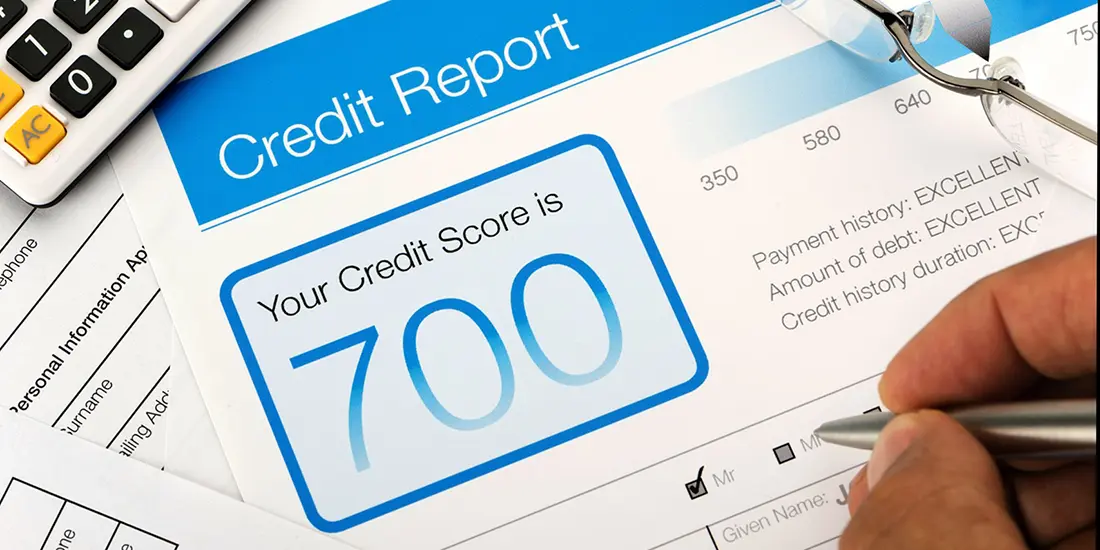
How Much Can I Borrow with a 700 Credit Score?
9 Min Read
Your FICO rating is one of the crucial factors lenders assess to determine your loan eligibility and terms. A higher credit score typically results in beneficial borrowing conditions, lower interest rates, and higher credit limits.
Although a 700 credit score is considered high, it’s not the only parameter that determines your maximum loan amount. Let’s find out how much you can borrow with a 700 credit score and explore other factors that may affect your loan amount.
- Key Takeaways
- Is 700 Considered a Good Credit Score?
- How Do Your Credit Scores Affect the Amount You Can Borrow?
- How Much Can I Borrow with a 700 Credit Score?
- What Is a Credit Score Impact on Your Loan Payments?
- How Does My Credit Score Calculate?
- How Can I Check My Credit Score?
- What Benefits Does a 700 Credit Score Provide?
- Ways to Improve Your 700 Credit Score Before Applying for a Loan
- FAQ
Key Takeaways
- With a 700 credit score, you’re likely to qualify for most loan types and borrow $100,000 or more.
- Lenders will also assess your overall financial shape when determining your borrowing limit.
- Boosting your FICO rating can potentially increase the maximum loan amount you can obtain.
Is 700 Considered a Good Credit Score?
Although each lender may set its own credit standards, a 700 credit score typically falls into the “good” category. Such a rating allows you to qualify for most loan types and get quite favorable borrowing conditions.
Here are the generally used credit scoring model ranges for FICO scores:
| Credit | Score Range |
|---|---|
| Poor | 300-579 |
| Fair | 580-669 |
| Good | 670-739 |
| Very Good | 740-799 |
| Exceptional | 800-850 |
Some lenders also use the terms “prime” and “subprime.” A 700 score is considered “prime” credit as it indicates an individual with a steady history of on-time payments. People with fair and poor credit fall into the “subprime” category and often face loan denials or less favorable borrowing terms.
How Do Your Credit Scores Affect the Amount You Can Borrow?
Lenders may be more willing to give higher loan amounts to borrowers with good and excellent credit as they are most likely to approach their debt obligations responsibly. “Prime” FICO ratings may also result in a higher credit limit on a revolving account. All this provided that you can comfortably repay the requested amount.
How Much Can I Borrow with a 700 Credit Score?
While a FICO rating of 700 increases your approval chances for most loans, the exact sum you can borrow is not determined based on just your credit score. Lenders also look at other parameters, such as your income, debt-to-income ratio, employment history, and current financial shape. Each loan provider wants to get their money back, so they pay special attention to your ability to repay the funds.
The maximum sum is also affected by the loan type and the repayment period you choose. While a personal loan is usually up to $100,000, a mortgage loan typically comes with much higher amounts. A longer repayment term reduces your monthly payment, making it easier to handle. This increases your paying capacity and makes it possible to borrow more money.
Each loan provider can also set their own limits on how much they are ready to lend. Some financial institutions specialize on huge loans for major purchases and life events, while others offer small personal loans of up to $5,000 or $15,000.
What Is a Credit Score Impact on Your Loan Payments?
Your loan payments mainly depend on two factors: the loan cost and the repayment period. While the repayment term is something you can choose on your own, an interest rate is highly affected by your credit score. The higher your FICO rating, the lower the interest rate you can expect to get.
According to Bankrate, the average personal loan interest rate for borrowers with good credit is about 13.5% to 15.5%. People with bad credit can expect to pay 28.5% to 32% annually. As you can see, a lower credit score comes with paying more in interest over the loan life. This will also affect the amount you pay on a monthly basis.
How Does My Credit Score Calculate?
Your credit score consists of several factors that reflect your overall financial behavior:
- Payment history. This is the biggest parameter that makes up 35% of your overall credit rating. It includes all the payments you make on your personal loans, credit lines, mortgages, and sometimes even bills. On-time payments may increase your score over time, while late ones lead to its decline;
- Credit utilization. This factor shows how much credit you use compared to all the available balances you have. It’s recommended to maintain your credit utilization ratio at 30% or less;
- Length of credit history. A long history makes it easier for a lender to analyze your behavior. If you’re a responsible borrower for a great while, your credit score will likely be higher;
- Credit mix. Lenders want to evaluate the way you handle different types of loans. If your credit profile is varied, it may increase your credit score;
- New credit. This factor reflects your applications for new loans that involve a hard credit check. If you request new loans too frequently, lenders may think you are experiencing financial difficulties.
How Can I Check My Credit Score?
Each borrower can request a free copy of their credit reports from three major credit bureaus once a year. Visit the AnnualCreditReport.com to check your scores across Experian, TransUnion, and Equifax.
Another option is to purchase your credit report directly from a bureau. The cost may range from $1 to $16 for one report, with Experian offering an all-inclusive package with reports from all three bureaus for $39.99.
You can also use free services offered by several lenders and credit card companies. These credit-tracking tools are usually available via companies’ apps. However, they typically show your monthly updates only.
Finally, you can turn to a credit counselor who will not only provide you with a credit report but will also help you improve your financial health.
What Benefits Does a 700 Credit Score Provide?
Having a 700 credit score comes with multiple advantages. Here’s what you can get.
Multiple Loan Options to Choose from
Borrowers with good credit can qualify for most loans available on the market. While people with lower credit may be limited to just secured loan options to get relatively favorable loan terms, those with a 700 score can shop around and find the deal that completely meets their needs.
Low Interest Rates
A good credit score always comes with a lower loan cost as lenders carry less risk when dealing with such borrowers. According to myFICO, people with 700 scores can get a 30-year, fixed-rate mortgage with the average APR of 6.542%, while a personal loan rate may be between 13.5% and 15.5%.
Increased Credit Limits
The better your credit score, the higher the credit limit you may be offered when it comes to credit cards. Just keep in mind that companies will also rely on your income and DTI to make sure you can afford the debt. Your credit card issuer may also increase your existing limits, which will positively affect your credit utilization ratio and the overall FICO score.
More Credit-Building Opportunities
Bad credit borrowers often get in a vicious circle where they can’t improve their credit health as lenders don’t give them a second chance. If you have a good score, you’re most likely to qualify for almost any loan you want. By making on-time payments, you can boost your score to an exceptional range over time.
Ways to Improve Your 700 Credit Score Before Applying for a Loan
Although a 700 credit score is considered good, there’s still room to grow. Follow these steps to raise your credit and access more benefits.
Pay Your Debts and Bills on Time
Your payment history makes up 35% of your overall credit score. Thus, making on-time monthly payments on your bills and loans is a must-do if you want to see your credit rise. Set up an autopay if you handle many loans and are afraid of overlooking some payments.
Keep Track of the Variety of Your Credit Accounts
Try to maintain a healthy mix of different types of accounts. This will show lenders that you’re good at handling different forms of debt. It’s ideal if your credit profile contains both installment loans and revolving credit lines.
Become an Authorized User of Someone with Strong Credit
If you have a trusted family member or friend with an old account in good standing, ask them to add you to it as an authorized user. This trick can sometimes result in an almost overnight increase, especially if you have a short credit history.
Keep Your Accounts Open
Old accounts have a positive impact on the length of your credit history and help you maintain a healthy credit mix. Closing them can unexpectedly drop your credit score by a few points.
Decrease Your Credit Utilization
This will show that you’re a responsible borrower who lives within their means and knows how to budget. Consider paying off some high-interest balances or consolidating credit card debt and keeping the accounts open. Another option is to ask an issuer for a higher credit limit.
Avoid Applying for New Loans Frequently
Lenders can see each hard credit inquiry you undergo. Frequent pulls may indicate that you’re now in a tight financial spot. This way, a temporary decrease in your credit rating will indicate probable risks for lenders.
Review Your Credit Reports Occasionally
No one is safe from mistakes, and credit bureaus can make them, too. Checking your credit reports from time to time will help you stay on top of your financial health and ensure the information in your profiles is accurate.
FAQ
How Long Does It Take to Build a Credit Score of 700?
If you demonstrate responsible financial behavior and follow a few credit-boosting tips, it may take you from 18 to 24 months to get to a 700 credit score. As a rule, the higher your starting rating, the more it will take to see the difference.
What Types of Loans Can I Get with a 700 Credit Score?
A 700 credit score allows you to get almost any loan, provided that you have a steady income. You’re welcome to apply for a personal loan, mortgage, credit card, car loan, and much more.
How Many People Have a 700 Credit Score?
According to The Motley Fool, borrowers with credit scores between 700 and 759 make up 17% of adult Americans, with an average credit score of 714.
Need Money for an Emergency?Apply



